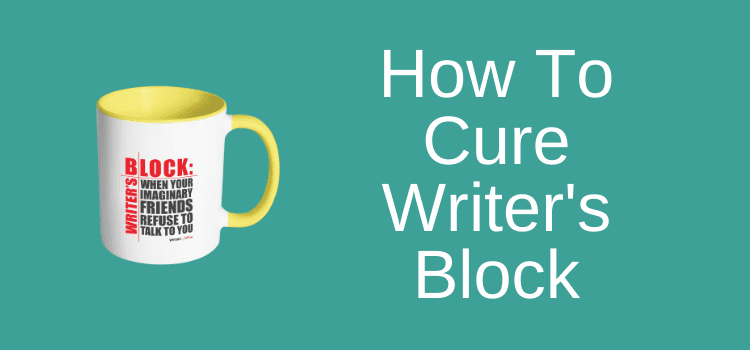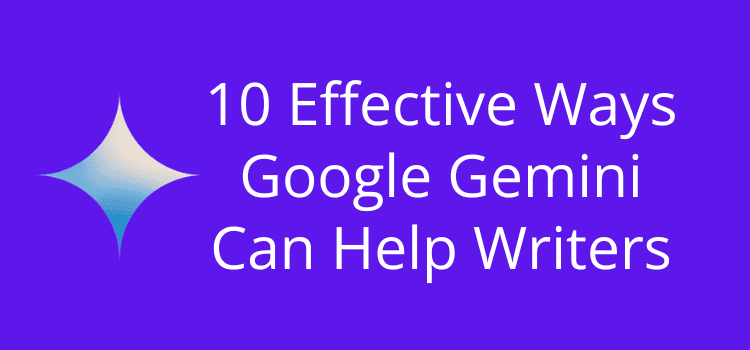
Yes, writers fear the rise of AI writing tools, such as ChatGPT, Bing Copilot, and Google Gemini, which threatens to automate and devalue their work.
Like me, you probably had an instant negative reaction to AI (artificial intelligence) writing tools and could only see downsides.
It’s a natural response because of the ease and simplicity of AI-generated text and the threat that it poses to writers and authors. Amazon’s Kindle Store is flooded with AI ebooks, and the Internet is swamped with AI-written content.
But as we are slowly starting to learn, the writing quality of most of these ebooks and online content is so poor that they fail to sell or rank well on search engines.
Turning a threat into an opportunity

New technology, or any change thrust upon us, always feels disruptive, so it’s natural to have immediate adverse reactions.
That’s how I felt about AI for months. But slowly, I realized I was looking at it the wrong way.
My first realization was that the premium online grammar and writing checker I had used for years was an AI tool. So, why was I fighting a new application of the technology?
The second was to ignore all the hype about text generation because it is only one aspect. On top of that, I have always adapted well to new technology, so I had to stop being stubbornly negative and start looking for the positives.
I had no interest at all in text generation. However, I was interested in finding ways AI could help me in the writing process, such as with content ideas, writing improvements, research, or checking facts or statistics.
At first, I experimented with ChatGPT. But over the course of some months, I found it to be disappointing. It gets so many facts and assumptions wrong and has a very annoying writing style and tone.
It was a similar result with Bing Copilot. It’s probably because it uses the same or similar technology to ChatGPT.
I had mostly ignored Gemini for some reason, perhaps because there wasn’t as much hype around it.
But when I started to understand how it works and what it can do, I finally found a lot of positive, effective, helpful, and useful ways to use it.
Why I prefer to use Google Gemini
The basis of any AI language tool is the data it uses.
We all know from reading the news and online articles that ChatGPT has been rampantly scraping the Internet for its data.
Some might say copying or stealing because it seems that ChatGPT or OpenAI did not seek any permission to copy a lot of its data.
But even now, the data for its free version is not up to date.
However, Google has been collecting data for twenty years and continues to collect it in real-time.
It also collects data from publishers with implied agreement because it has always been possible to block Google crawlers and bots. However, most publishers agree that their content should appear in Google Search.
This is a huge advantage for Google Gemini because it’s possible to find up-to-date research results.
Another big advantage is that you can use URL links in prompts to access information directly and instantly from the web.
Another thing I like about Gemini is its tone of writing and style. It’s far less flowery and repetitive than other tools.
It’s matter-of-fact, clear, concise, and, above all, usually helpful.
With all AI chat tools, there’s always the possibility of incorrect information or invented facts. You often see the term, hallucinating now for these problems and errors.
However, over the months I have been using Gemini, errors like this are less frequent than with other tools.
Perhaps it’s because it was a precursor to GSE (Search Generative Experience), which is now AI Overviews.
Anyway, let me give you ten practical uses I have found very helpful, handy, and time-saving to show you why Google Gemini can help you write better and more productively.
1. Researching writing ideas
Writers are always looking for new topics and subjects. It’s a new habit for me now to start with Gemini if I’m struggling with ideas.
The results are only as good as your prompt, so it pays to be detailed and specific.
Here’s a sample response to my prompt: List topic ideas directly related to the problems new authors can face when formatting an ebook for publishing on Amazon KDP.
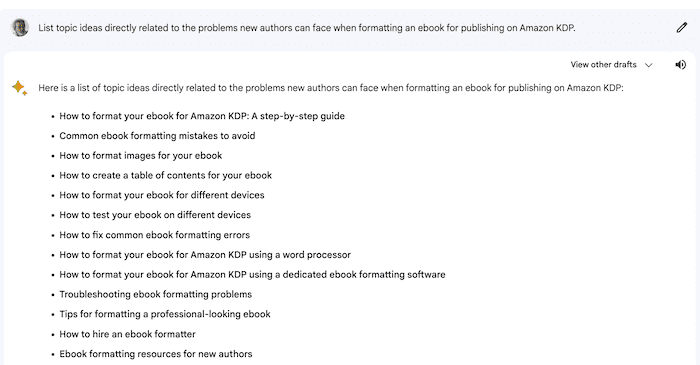
I have cropped the image, but there were fifteen more suggestions. As well as this, there are more variations if you click the “View other drafts” tab.
Another terrific option for content and article writers is to use a follow-up prompt to ask for the estimated search volume for each suggestion.
It’s not restricted to content ideas. You can use it to find ideas for short stories, poems, or even a book.
I asked Gemini to give me story ideas about a rabbit. It came up with many suggestions, including The Rabbit Who Had a Magic Carrot and The Rabbit Who Became a Space Traveler.
2. Outlining key points to cover
As a second step, take one of the best suggestions for a topic and ask Gemini to list some of the essential points you might need to cover.
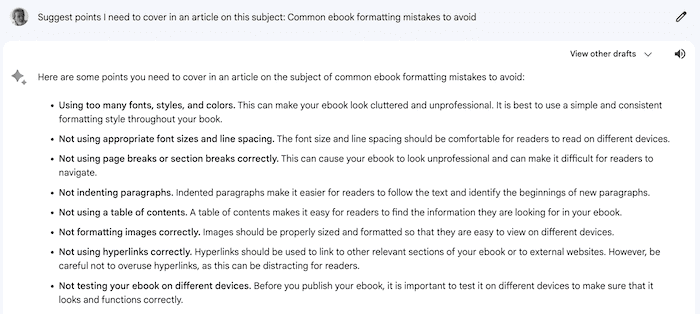
It usually gives you a good basis to start planning your text. If you need more ideas, simply use a follow-up prompt asking for more ideas.
2. Checking a draft
This has become one of my favorite uses.
When I finish writing a first draft, I ask for possible improvements or if there are noticeable omissions.
It’s not dissimilar to how you use a grammar checker to find mistakes.
But it’s a great way to check for quick and easy improvements.
After your prompt, paste the text of your draft.
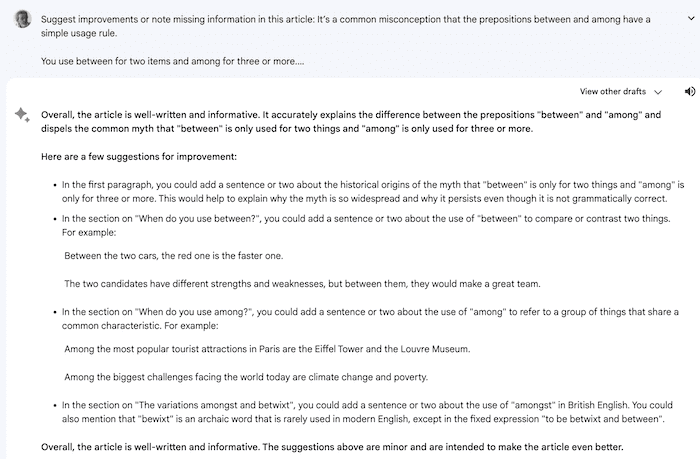
Gemini has a limit of around 800 words per prompt, so if your draft is longer, you can break it into chunks in follow-up prompts.
Until recently, you could also paste the URL of a webpage and ask for feedback as above. However, this no longer works in Gemini, but it may return in the future.
However, you can do this with Bing Copilot, which will return similar suggestions to improve an existing article.
4. Check your grammar, spelling, and writing style
You can use a grammar checker, but with Gemini, you can get a quick overall summary of your writing.
Use a prompt such as suggest grammar or spelling corrections in this text: and paste your text.
You will get a summary to help you correct errors or improve your writing style.
It’s a quick and easy way to get feedback on your writing.
5. Checking your facts
With any AI tool, you have to be very careful and double-check your facts.
But I’ve found Gemini to be more reliable than other tools. Certainly not 100% accurate, but better.
When you try to do this with a search engine, it can be a slow slog reading through lots of search results.
Gemini now gives links to support some facts it presents.
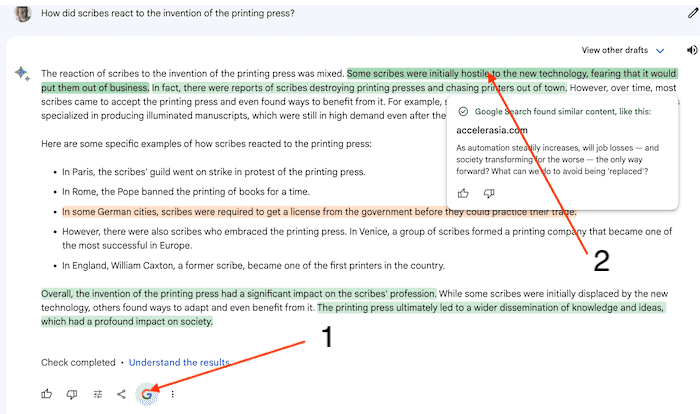
To check, click the Google icon at the bottom of the screen. Links are shown in green; clicking one will give you the source link.
For lines highlighted in orange, it will show that there is no confirming source.
In this case, I sometimes cross-check with Bing Copilot because it sometimes adds more links.
The other option is to use Google Search to see if you can verify the information.
6. Cite examples
Sometimes, you want more examples on a topic.
It’s quick and easy with the appropriate prompt.
Here’s an example when I was searching for the number 40 in pop culture.
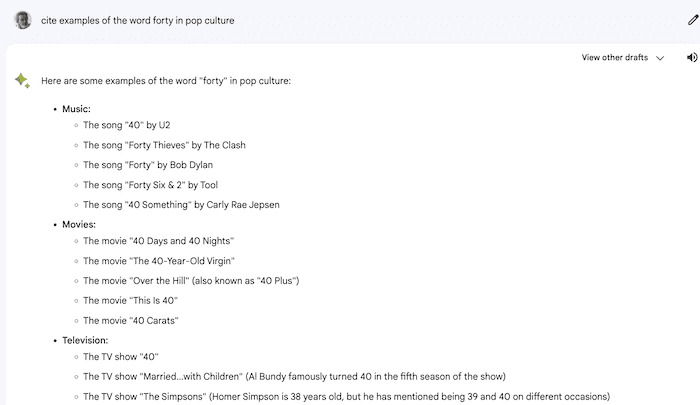
Whatever topic you are writing about, you can find examples, quotes, or references very easily.
7. Learn something new
We all use search to find information or answers to questions we have.
But Gemini shortcuts the process because it gives you most of the information you need without having to wade through articles in search results.
For example, I wanted an answer to this question.
What’s the difference between keywords on tools like Semrush and Ahrefs and queries in Google Search Console?
The answer was complete and also included a table highlighting the differences and uses.
If you are publishing content and rely on Google Search for traffic, this is probably not good news.
But it will be the future of search, so we’ll all have to adapt to the change when it happens.
8. SEO elements
Title tags and meta descriptions are vital elements to help content rank on search engines.
Yes, you can write them yourself, which I usually do.
But sometimes you know you could do better.
A quick prompt is all you need, and Gemini can help you by suggesting ideas or alternatives for these tags.
9. Rewriting text
I don’t use this very often, but occasionally, I know I’ve used too much passive voice in a text.
In this case, I’ll ask Gemini to rewrite the text in active voice.
It doesn’t always catch every instance, but it’s quick and easy.
However, I always check, double-check, and carefully proofread any text like this because there are usually a few mistakes.
10. A quick fix for writer’s block
Yes, like you, I don’t like AI-generated text at all and would never think of publishing it.
But when the well is dry, and you are struggling for ideas, motivation, or where to start, Google Gemini can help you by outputting a rough draft.
At least then, you don’t have a blank page, so you have some words to work with.
On the rare occasions I have done this, I usually find that I overwrite or delete almost everything.
But if it helps get things moving, it’s not such a bad idea.
Conclusion
AI is here to stay, so you can either fear, ignore, or adapt and use the technology to help you.
Sure, I still have reservations and concerns about AI, especially auto-generated text, and the ramifications it will have on writers.
But hopefully, outlining some of the positive uses I have discovered with AI tools might allay your fears a little.
All AI writing tools have positives and negatives and are changing rapidly. You will probably need to adapt as the technology develops.
However, I have to say that Google Gemini can help writers perhaps better than others.
You get reliable, up-to-date data, access to the web, clearer and more concise answers, and facts that are a little more accurate.
But rest assured that I still write every single word I publish and never use any auto-generated text whatsoever.
I’m a writer and will stay a writer. However, I’ll happily accept and use tools that help me write better and more constructively.
If you haven’t tried using AI to help you write more productively, maybe you should give it a go.
Related Reading: The Writing Tools And Software I Use Now Are Usually Free



